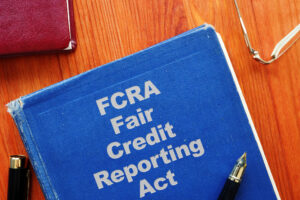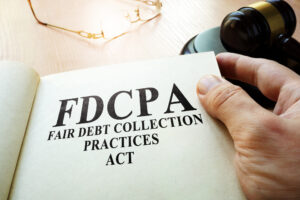Credit reports contain a wealth of personally identifying financial information and offer a peek into a consumer’s current, and past, financial status. The privacy of these reports, and the accuracy of their information, is critical to consumers. Prospective lenders, employers, landlords and utility companies may need to request access to reports to determine whether to extend credit, offer a job or a place to live.
The Fair Credit Reporting Act is the federal law that governs how credit information is used and distributed. Consumers have the right to see their reports, who may have accessed it, and dispute any errors that appear and get them corrected.
Who can access your credit report?
 An individual or business may request access to a consumer’s credit file, but they must obtain written permission from the consumer. Often, during the process of applying for credit, interviewing with a prospective employer or landlord, or applying for utilities, there may be a request to access the consumer’s credit file. Many times the credit application will serve as written permission. Other times, a specific document will be presented to the consumer for his or her signature.
An individual or business may request access to a consumer’s credit file, but they must obtain written permission from the consumer. Often, during the process of applying for credit, interviewing with a prospective employer or landlord, or applying for utilities, there may be a request to access the consumer’s credit file. Many times the credit application will serve as written permission. Other times, a specific document will be presented to the consumer for his or her signature.
Periodically, lenders with whom you already have credit accounts are also given permission to access your credit reports as part of their account review process. These inquiries, however, would not negatively impact your credit scores.
In some instances, the government is also permitted to access your credit reports, specifically if responding to a court order or subpoena, or when reviewing your eligibility to certain governmental benefits.
Monitor your Credit Reports for Privacy and Accuracy
 Consumers must monitor their reports, not only for accuracy, but to see who has accessed his or her credit file. The three main credit bureaus, Transunion, Experian and Equifax, are required to keep track of instances in which credit reports are accessed, and who is accessing them.
Consumers must monitor their reports, not only for accuracy, but to see who has accessed his or her credit file. The three main credit bureaus, Transunion, Experian and Equifax, are required to keep track of instances in which credit reports are accessed, and who is accessing them.
Impermissible Credit Pulls include:
- A sales company pulling a credit report before a consumer has given an OK.
- A creditor that pulls a report after debt is discharged in bankruptcy.
- A creditor pulling a report after the account has been closed.
- A potential employer pulling a report during the interview process.
- A potential landlord pulling a credit report without permission.
What is ‘Hard’ v. ‘Soft’ Credit Inquiry
In general, two types of credit inquiries exist: a hard inquiry and a soft inquiry.
-
-
- A ‘hard’ inquiry, is when a lender with whom you’re applying for credit reviews your credit reports within the scope of their process to decide whether to approve or decline the new credit application. Too many hard inquiries on one’s credit report is not a good sign to lenders, since it signals that you either have too many accounts open, that you are having financial difficulty, or that you are at risk of overspending.
- A ‘soft’ inquiry, is when a lender or credit card company reviews your credit reports as part of a preapproval process for some type of promotional offer. The important thing to remember is that a ‘soft’ credit pull will not hurt your credit score.
-
How do I know if someone accessed my report?
Credit reports are divided in to sections, such as: Personal Information, Public Records, Account Information, Satisfactory Accounts, Closed Accounts, Collections, and Inquiries. The Inquiry section lists all individuals or companies that have accessed the consumer’s report and includes the name of who inquired, the date of the inquiry, the type of business and the businesses’ contact information. The consumer may write to the address of the inquirer to request an explanation for the inquiry.
How do you get your Credit Reports?
All consumers are entitled to one free credit report every 12 months from TransUnion, Experian and Equifax. Often, the credit bureau will request two forms of identification with your request which confirm who you are and where you live. You may choose to submit a current driver’s license, utility bill or pay stub. Consumers that wish to view their reports more often could enroll in a credit monitoring service, or pay to receive additional individual reports from each bureau.
3 Options to obtain credit reports:
-
-
- Write to the credit bureau.
- Visit the website: annualcreditreport.com.
- Call toll-free –877-322-8228.
-
Have you become a victim of Identity Theft?
Periodic reviews of credit files can help ensure that no fraudulent activity has occurred with your financial information. By checking your credit reports frequently, you can see whether credit applications or unfamiliar accounts were opened in your name, or that your file was accessed without permission. If you discover that you may be an identity theft victim, place a fraud alert on your credit report to alert the bureaus that you must be contacted when credit applications are filed.
How do you dispute Credit Reporting Errors?
Credit reports must be accurate. When you discover errors or listings that are unfamiliar, a written dispute letter must be sent to the credit bureau. The letter must clearly identify the error and state the action required to correct the problem. In addition, the bureaus must receive documents which support the claim for correction.
Get help from a Qualified Consumer Law Firm
 Flitter Milz is a nationally recognized consumer protection law firm that represents consumers in matters involving credit reporting accuracy and privacy. Contact us for a no cost evaluation of whether your consumer rights have been violated.
Flitter Milz is a nationally recognized consumer protection law firm that represents consumers in matters involving credit reporting accuracy and privacy. Contact us for a no cost evaluation of whether your consumer rights have been violated.



 Being asked to co-sign a loan for a family member or close friend is a larger responsibility than most people realize. When you co-sign a loan, such as an auto loan, you and your credit are on the hook if that relative or friend decides to stop making payments on the loan. In other words, by co-signing, you are a co-borrower and must accept responsibility of terms stated in the loan agreement.
Being asked to co-sign a loan for a family member or close friend is a larger responsibility than most people realize. When you co-sign a loan, such as an auto loan, you and your credit are on the hook if that relative or friend decides to stop making payments on the loan. In other words, by co-signing, you are a co-borrower and must accept responsibility of terms stated in the loan agreement. Once the vehicle is sold, the lender may assign collection of the deficient balance to a debt collector or law firm collector. If the loan balance is not paid, the lender could choose to
Once the vehicle is sold, the lender may assign collection of the deficient balance to a debt collector or law firm collector. If the loan balance is not paid, the lender could choose to  Co-signing a loan should not be taken casually. The co-signer must consider whether or not credit may be needed for him or herself. If a co-signer has too much
Co-signing a loan should not be taken casually. The co-signer must consider whether or not credit may be needed for him or herself. If a co-signer has too much  individual the money for the purchase. In other words, you lend the individual the money and they pay you back in installments over time, or whatever agreement the two of you come up with.
individual the money for the purchase. In other words, you lend the individual the money and they pay you back in installments over time, or whatever agreement the two of you come up with. There may be a knock on your door by a friendly solar panel sales representative. You may be informed of the benefits of solar power and that by choosing to get panels for your home they would be ‘free’.
There may be a knock on your door by a friendly solar panel sales representative. You may be informed of the benefits of solar power and that by choosing to get panels for your home they would be ‘free’. A solar company sales representative may inform you that by signing up for solar power, you won’t have to pay for the panels themselves — they will be given to you for free.
A solar company sales representative may inform you that by signing up for solar power, you won’t have to pay for the panels themselves — they will be given to you for free. Because both of these types of arrangements – a lease and a PPA – involve paying for electricity-generating equipment over a lengthy contract period, those ‘free’ panels that you were promised may be anything but. Once installed on your home’s roof, you will still end up paying toward an entire system that is leased or rented, for a number of years. In the end, the savings you may reap from the solar generated electricity itself may not be enough to make up for those ‘free’ panels.
Because both of these types of arrangements – a lease and a PPA – involve paying for electricity-generating equipment over a lengthy contract period, those ‘free’ panels that you were promised may be anything but. Once installed on your home’s roof, you will still end up paying toward an entire system that is leased or rented, for a number of years. In the end, the savings you may reap from the solar generated electricity itself may not be enough to make up for those ‘free’ panels. Many door-to-door solar sales representatives often ask the consumer to make quick, on-the-spot decisions about obtaining solar power for the home. It is not unusual for the homeowner to feel pressured and the need to act immediately.
Many door-to-door solar sales representatives often ask the consumer to make quick, on-the-spot decisions about obtaining solar power for the home. It is not unusual for the homeowner to feel pressured and the need to act immediately. Flitter Milz is a nationally recognized consumer protection law firm experienced in evaluating fraudulent sales tactics, such as forgery, identity theft and unauthorized credit pulls by solar panel salesmen. If you feel as though you may have been
Flitter Milz is a nationally recognized consumer protection law firm experienced in evaluating fraudulent sales tactics, such as forgery, identity theft and unauthorized credit pulls by solar panel salesmen. If you feel as though you may have been 
 J
J
 2. Obtain Current Credit Reports. Transunion, Experian and Equifax are the three main credit reporting agencies. Consumers are entitled to receive one free credit report from each bureau every year. Sometimes, consumers choose to enroll in a credit monitoring service which enables review of credit reports on a regular basis throughout the year.
2. Obtain Current Credit Reports. Transunion, Experian and Equifax are the three main credit reporting agencies. Consumers are entitled to receive one free credit report from each bureau every year. Sometimes, consumers choose to enroll in a credit monitoring service which enables review of credit reports on a regular basis throughout the year. 4. If Inaccurate…Dispute! After obtaining your credit report, if there are errors, you should
4. If Inaccurate…Dispute! After obtaining your credit report, if there are errors, you should  One Dispute Letter Per Error. If you find multiple errors on a credit report, dispute them individually with the bureau. Enclose a copy of the credit report with the error highlighted and your supporting documents. The credit bureaus then have 30 days to respond to your dispute letter.
One Dispute Letter Per Error. If you find multiple errors on a credit report, dispute them individually with the bureau. Enclose a copy of the credit report with the error highlighted and your supporting documents. The credit bureaus then have 30 days to respond to your dispute letter. The Fair Credit Reporting Act
The Fair Credit Reporting Act  Flitter Milz, P.C. represents people in consumer credit matters related to credit reporting accuracy and privacy, abusive debt collection contact and vehicle repossessions which stem from a pending divorce or separation.
Flitter Milz, P.C. represents people in consumer credit matters related to credit reporting accuracy and privacy, abusive debt collection contact and vehicle repossessions which stem from a pending divorce or separation. 

 Crafting a household budget is not only necessary to help evaluate spending patterns and measure income versus expenditures, but it also helps to ensure a secure financial future.
Crafting a household budget is not only necessary to help evaluate spending patterns and measure income versus expenditures, but it also helps to ensure a secure financial future. If you know how much money is coming in versus going out each month, it becomes less likely that you’ll overspend to the point where payments are skipped or missed. Create the budget that you can stick to with a payment schedule that you can meet. When you stay in charge of your finances, you decide when it’s time to make a new purchase, whether it be for a home, education, a new vehicle, or another personal expense.
If you know how much money is coming in versus going out each month, it becomes less likely that you’ll overspend to the point where payments are skipped or missed. Create the budget that you can stick to with a payment schedule that you can meet. When you stay in charge of your finances, you decide when it’s time to make a new purchase, whether it be for a home, education, a new vehicle, or another personal expense. Flitter Milz is a nationally recognized consumer protection law firm that represents victims with consumer credit problems, such as credit reporting accuracy and privacy issues, abusive debt collection tactics, wrongful vehicle repossession, which stem from over-spending. If you have errors on your credit reports, have received contact from debt collectors, or your auto lender has repossessed your vehicle,
Flitter Milz is a nationally recognized consumer protection law firm that represents victims with consumer credit problems, such as credit reporting accuracy and privacy issues, abusive debt collection tactics, wrongful vehicle repossession, which stem from over-spending. If you have errors on your credit reports, have received contact from debt collectors, or your auto lender has repossessed your vehicle,  The holiday shopping season is, under normal circumstances, a big stressor on the wallet. But this year proposes to be even more difficult than in years past, given that the global COVID-19 pandemic has led to massive job losses and financial hardships for people far and wide. Although the federal
The holiday shopping season is, under normal circumstances, a big stressor on the wallet. But this year proposes to be even more difficult than in years past, given that the global COVID-19 pandemic has led to massive job losses and financial hardships for people far and wide. Although the federal  The danger in over-spending comes when that monthly bill is due, and you are still unable to come up with the cash to pay it off. Not paying
The danger in over-spending comes when that monthly bill is due, and you are still unable to come up with the cash to pay it off. Not paying  Using a credit card makes it easy to over-spend, especially during the holidays. The freedom of making purchases with a credit card today, could make it difficult to pay the bill the following month if purchases get out of hand.
Using a credit card makes it easy to over-spend, especially during the holidays. The freedom of making purchases with a credit card today, could make it difficult to pay the bill the following month if purchases get out of hand. Credit reports
Credit reports Flitter Milz is a nationally recognized consumer protection law firm that represents people with credit reporting accuracy and privacy issues, contact from abusive debt collectors and wrongful repossession. If you are someone who has suffered a hardship during the pandemic and feel as though your consumer rights have been violated by the credit bureaus, a lender or debt collector,
Flitter Milz is a nationally recognized consumer protection law firm that represents people with credit reporting accuracy and privacy issues, contact from abusive debt collectors and wrongful repossession. If you are someone who has suffered a hardship during the pandemic and feel as though your consumer rights have been violated by the credit bureaus, a lender or debt collector, 





 Flitter Milz is a nationally recognized consumer protection law firm experienced in representing consumers who have suffered from abusive debt collection practices and credit reporting errors.
Flitter Milz is a nationally recognized consumer protection law firm experienced in representing consumers who have suffered from abusive debt collection practices and credit reporting errors. 







